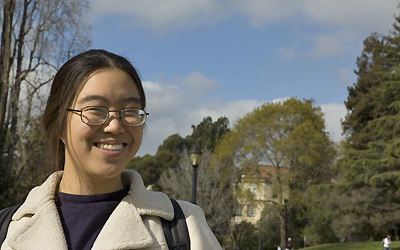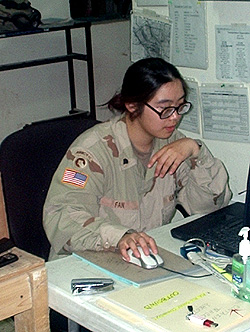UC Berkeley Web Feature
 |
Fonda Fan, now back at UC Berkeley. (Bonnie Azab Powell photo) |
"We had no notions of being heroes … we missed normalcy": Sergeant and sophomore Fonda Fan describes her year in Iraq
Editor's Note: Fonda Fan, a sophomore English major at UC Berkeley, returned in November from a year in Iraq. Now 20, Sergeant Fan joined the Army Reserves at 17, just after finishing high school in Los Angeles. In October 2004, after her freshman year at Berkeley, she was deployed for Operation Iraqi Freedom. Her unit was stationed in Tikrit, in central northern Iraq. She began her "in country" tour with three other women in the unit, but before long, two were transferred elsewhere. Since her service contract does not end until 2008, she expects to be called up again.
Fan wrote about her time in Tikrit at the NewsCenter's request.
 'The general feel of Iraq was of hostility. As one soldier remarked sardonically, "Everything in Iraq either wants to bite, infect, shoot, or kill you."' -Fonda Fan |
Getting deployed to Iraq was not a straight-shot kind of deal. For my unit and just about every other unit I know of, it took some meandering, some delay, and some downtime before we got in country. We had been brushing up on common soldier tasks like first aid and artillery practice with our M16s for three months before we finally got on that plane for the 24-hour flight overseas. Once we landed - jet-lagged, disheveled, and rather grumpy - we still weren't in Iraq. Instead, we were standing in Kuwait, ready to do another month of mission-specific training.
Kuwait was definitely not Kansas. The sand was coarse and thick, the sunlight reflected white, harsh, and hot off the ground, the land rolled out in flat waves, and it was cold and dark at night. It was quiet though, peaceful. Tents dotted the tiny camp and a signal tower was the only structure that broke the monotony of smooth shapes. I thought that this little country just south of my destination was a preview of what was coming, but I soon learned that not all deserts are built equal.
When we got into Iraq we were surprised to find that the environment was entirely unique. Not even the sand was the same, baby-powder fine in some regions, nonexistent in others, but never quite the white, clean, coarse sand of Kuwait. There were buildings in the base at least, old remnants of what the Iraqi soldiers used to inhabit; more hardball roads within; thin, pale-looking trees; some scratchy-looking yellow grass; and an insane amount of sparrows. The sun was still hot, the moon still cold, but that was about all the two countries had in common. The entire attitude and way of life were dissimilar.
In Iraq, Black Hawk and Chinook helicopters were constantly patrolling the sky, the whup-whup-whup of their rotary blades a familiar aerial melody. Humvees and a host of other military vehicles moved down the roads noticeably armored, with thick windshields and windows, plated doors and sides, yet some were battle-damaged despite the extra plating. Fellow soldiers walked up and down the ways with their helmets on and carrying weapons always, a standard of uniform that soldiers in Kuwait didn't have to follow. No one was allowed into any facility unless the uniform was correct and ID was present. We weren't even allowed to sleep in civilian clothes — although that was not a rule easily enforced.
Now and again mortars or rockets would land inside our perimeter with a thud that could be heard throughout the base, accompanied by a huge dust cloud. That was the sign for us to retreat into bunkers until an "All clear!" message was announced over the radio, proof that we could move on with our jobs. Now and then the blasts would be from professionals detonating munitions discovered outside, making it often difficult to distinguish between an attack or a controlled blast.
My detachment, working as a movement control team for our base, was lucky in the sense that we did not have to leave the base. We dealt with paperwork and computers instead, tracking convoys that moved from our base, managing the third-country nationals who brought supplies in and out, building cargo pallets for the airplanes that carried everything from garbage to PAX [personnel], just about anything connected with movement and supply. We weren't on the front lines, but we heard all the stories, either from the intel reports we received monitoring our convoy movements, or straight from the mouth of those who were there.
| We had no notions of being heroes; we were not fed by intense patriotism.
I joined the Army simply because I needed money for college. There
were many more just like me. Still others joined because they did
not want to go to college, or for the travel opportunities, or the
chance to shoot big rifles. |
It was interesting. For part of the deployment I worked on the night shift, when all the wildlife liked to come out. I saw plenty of camel spiders extending their long legs with an agile, uncanny speed; sand flies flitting about under the fluorescent lights, small but with a painful bite; foxes wandering through the sand; and even lithe snakes slithering away. It was one thing to see all these creatures, but we were strictly commanded to have as little to do with them as possible. Camel spiders were leapers with bite, sand flies could carry a skin disease known as leishmaniasis, the foxes might have rabies, and the snakes could very well be poisonous.
The unpleasant potential of the animals was mirrored by the insurgents. Convoy commanders would talk to me about bombs buried in the dirt that blew by remote control or a cell-phone signal. The freedom fighters were getting good at their style of guerilla warfare, too, packing more explosives, effectively seeking weak points, inventing new tricks to hide bombs from the naked eye. They launched rockets, fired from electric lines and crowds, so that no offensive action could be taken without endangering civilians. They retreated and sniped, engaged and ran. They infuriated and frustrated. The general feel of Iraq was of hostility. As one soldier remarked sardonically, "Everything in Iraq either wants to bite, infect, shoot, or kill you."
We were in danger, and we knew it. People around us kept repeating that simple statement, and we were observant enough of the situations around us. Few of us had volunteered to come here. We had no notions of being heroes; we were not fed by intense patriotism. I joined the Army simply because I needed money for college. There were many more just like me. Still others joined because they did not want to go to college, or for the travel opportunities, or the chance to shoot big rifles, or to have something to do while they figured out the rest of their life's plans.
Bringing the war back to Berkeley |
Being in the desert was comfortable enough physically: we had to use porta-johns as opposed to toilets, we had shower trailers instead of regular running water, we didn't have a wide selection of personal hygiene or personal products to choose from, and we had to take our laundry to a base-wide laundromat for turn-in, but these required simple adjustments. It was the little things that were hard to get over: feeling safe, feeling normal. We missed things back in the States: homes, families, friends, girlfriends, boyfriends, wives, husbands, pets, careers, cars, food. We missed normalcy.
There were plenty of opportunities for us to give in to nostalgia and depression, I suppose; in retrospect, the amazing thing is that we didn't. I'm not saying that we never felt blue, but we made do. We didn't talk much about why were in Iraq, doing that would have probably invited some bitter opinions, but we made small talk, normal things, chit-chat about a song we liked, jokes about an officer we didn't. We gushed about a cute stranger that passed by, another military type most likely, and of course, complained about work. We kept our military mindset but we just as stubbornly held onto our personalities beyond the uniform. We kept our chins up because the only other alternative was to let them drag in the dirt.
Tell us what you think |
We went through mortar and rocket attacks, an enemy infiltration, a chemical spill at the airfield, a bomb planted in a porta-potty, a political argument over supplies of armor kits, a mortar round in the truck yard, and a criminal investigation - all with a sense of humor. It wasn't because we weren't taking things seriously, we responded as we had to when each situation came up, and it wasn't because we were trying to put on a brave face. It was merely because we needed to smile a little and laugh a little to get through each day. In the bunkers or on guard, someone was always wry enough to crack a joke or make a comment, and I have to be thankful for that.
We faced threats on an emotional and mental front as well as a physical one, and for us, a little cheer was the best defense we had. If we tried hard enough to put things in perspective, camel spiders and suicide bombers were on about the same level: unpleasant things we had to deal with, but nothing that could bring us down. And that had to be something we could grin about.
More related stories:
- "From jarhead to bowl maker: Grad student Ehren Tool's art of war," Oct. 27, 2004, UC Berkeley NewsCenter
- "Berkeley and the ROTC: Enrollment is climbing, and student attitudes are shifting," October 11, 2002, UC Berkeley NewsCenter

 My
mother has brought the Iraq war home to millions of Americans — but
especially to me
My
mother has brought the Iraq war home to millions of Americans — but
especially to me "We
had no notions of being heroes
… we missed normalcy"
"We
had no notions of being heroes
… we missed normalcy" "We're
going to be doing these things for a long time"
"We're
going to be doing these things for a long time" No
showers and giant rats
No
showers and giant rats "I
know Berkeley is a place where most people don't know anyone
in the military, but we are out there," wrote alum Lisa
J. Olsen, '83. We're posting comments on this series sent via
e-mail to
"I
know Berkeley is a place where most people don't know anyone
in the military, but we are out there," wrote alum Lisa
J. Olsen, '83. We're posting comments on this series sent via
e-mail to